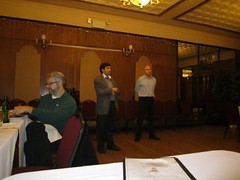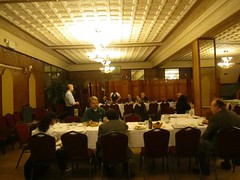 Molly O’Toole Jim Lesczynski (left) of the Manhattan Libertarians, with New York state Libertarian Chairman Mark Axinn and Manhattan Libertarian Chairman Ron Moore.
Molly O’Toole Jim Lesczynski (left) of the Manhattan Libertarians, with New York state Libertarian Chairman Mark Axinn and Manhattan Libertarian Chairman Ron Moore.The chairs are eerily empty, the table settings untouched. A blonde waitress in a black apron, seated in the far corner, says something in a language I don’t understand.
“Libertarian?” she repeated, this time in English, with a heavy Eastern European accent. I nod, and she points to another doorway.
The backroom of the tucked away Ukrainian East Village Restaurant seems an unlikely meeting spot for the Libertarian Party, but once a month its members gather loyally here to share their fiscally conservative, socially liberal ideology and some spinach pierogis.
It can’t be easy to be a Libertarian in this neighborhood, whose preferred political fare is liberal Democratic. Last week’s election was no exception.
In the only East Village position contested beyond the two major parties — U.S. Representative for the 14th District — Democrat Carolyn Maloney was elected to her 10th consecutive term with 75 percent of the vote (the Democrats swept the East Village races and most of New York state’s). The Republican facing Ms. Maloney garnered 22 percent, and the Independents and Conservatives earned only 2 percent each.
Ron Moore, chair of the Manhattan chapter of the Libertarian Party, would know — he has lived in the East Village for 30 years.
“It’s no harder to be a Libertarian here than it is in any place,” Mr. Moore said at Monday’s meeting, “though you’re surrounded by fiscal liberals who aren’t listening to economics or reason.”
The Midterm elections gave the Republicans a historic victory nationally, but the results also gave New York’s Libertarians something to clank a few Eastern European beers over.
New Yorkers cast a record roughly-190,000 votes for third party candidates for governor on Nov. 2. Libertarian Warren Redlich earned 45,865 votes — the party’s best New York showing, said state Libertarian Party Chair Mark Axinn.
“We Libertarians more than tripled our results,” Mr. Axinn told roughly a dozen members of both the Manhattan chapter and also the state Libertarian Party, scattered around banquet tables arranged in a “u” in the backroom of the restaurant. “It shows the electorate as a whole recognizes there’s other votes on the table.”
 Molly O’Toole At the monthly meeting of the Libertarian Party at the Ukrainian East Village Restaurant, Manhattan chapter Chairman Ron Moore addresses the roughly dozen members in attendance.
Molly O’Toole At the monthly meeting of the Libertarian Party at the Ukrainian East Village Restaurant, Manhattan chapter Chairman Ron Moore addresses the roughly dozen members in attendance.The Libertarians fell 4,135 votes short of the party’s goal to reach 50,000 – a figure that would guarantee them a ballot line for the next four years, according to New York electoral law. Though some ballots have yet to be counted, next year the Libertarians may have to gather the 15,000 signatures required of a third party to get on the ballot again.
Yet according to Mr. Moore, the 34,000 signatures for Libertarians in 2010 were the most they’ve ever had.
“We’ve got to keep the momentum we have here on for 2012,” he urged his fellow party members as they ate and drank. He added conspiratorially, “I have it on good authority that Ron Paul is considering another run …”
This momentum has carried the Libertarians a long way since the 1990s, when the Manhattan chapter died due to a lack of interest.
But in 2000, Jim Lesczynski, who also lives in the community, helped revive the Manhattan Libertarians and re-institute monthly meetings at the Ukrainian restaurant.
Though Mr. Moore says he agrees with a few “practical” measures recently undertaken in the East Village such as instituting business restrictions to reduce noise violations, he calls concepts like congestion pricing “obscene.”
Mr. Moore and other local Libertarians think the community’s variety may make their political party a more successful sell in the future.
“The East Village is full of people who have diverse life styles,” said Mr. Moore before calling the meeting to order. “They don’t need the government telling them how to live their lives. They’re small businesspeople, relatively socially liberal – you don’t find a lot of people here arguing against those things.”
But as subtle strains of Prince — “Tonight we’re gonna party like it’s 1999” — floated from the restaurant into the meeting, many seats remained empty.
Occasionally the waitresses would glide through, balancing dishes before returning to their competing conversation in Ukrainian.
Marina Kotovska, who came to New York a year ago, said that the waitresses sometimes listen to the Libertarians’ discussion.
She was asked: Do other people ever use the backroom?
“Not really, just Libertarians,” she said. “But we do have tango every Friday.”



